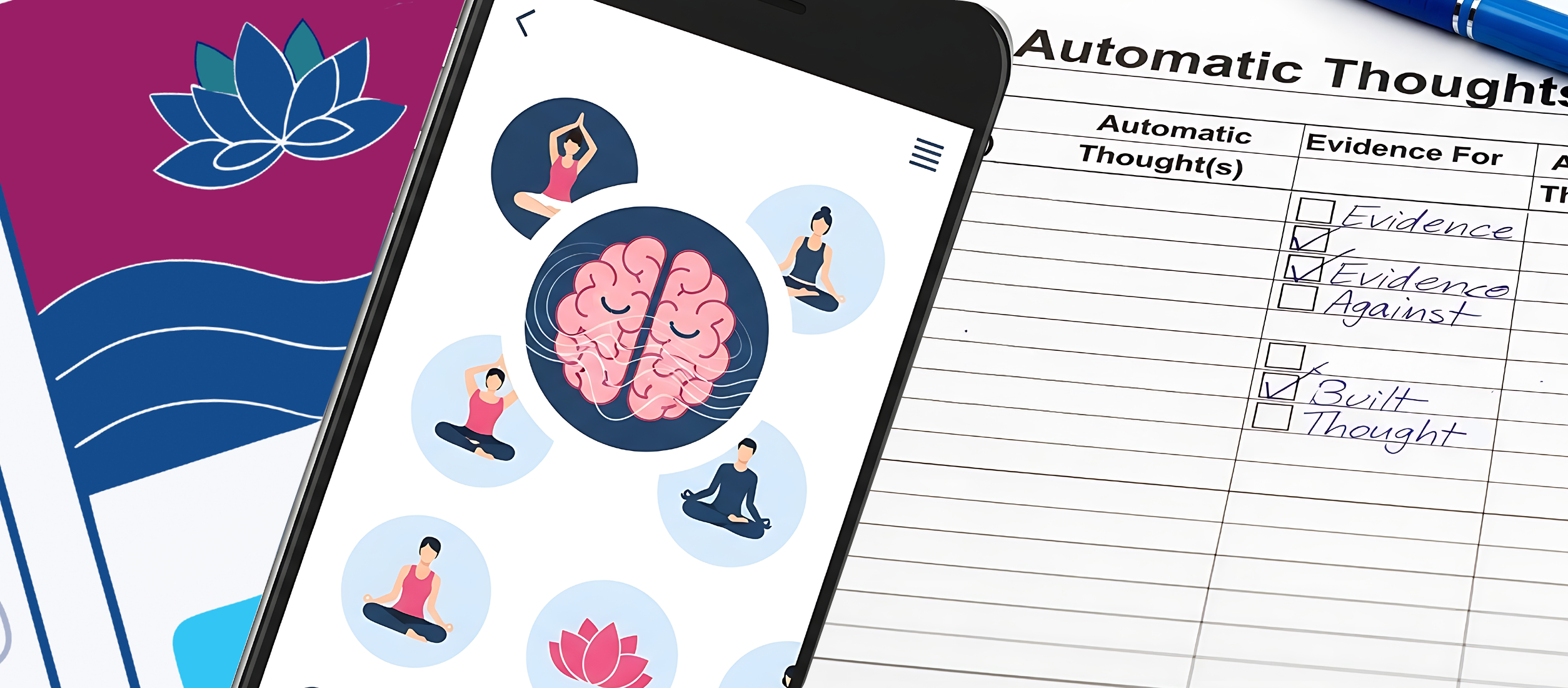CBT vs. DBT Telehealth Tools: Theoretical & Structural Differences
DBT Diary Cards: Continuous Skill & Target Tracking
The diary card is a valuable tool in DBT protocols: clients record daily ratings of emotions, urges, target behaviors (e.g. self‑harm, substance use), and whether or not they used specific DBT skills (namely mindfulness, distress tolerance, emotion regulation, interpersonal effectiveness) on each day. The card is meant to be brought to sessions and used for review, chain-analysis, goal setting, and coaching.
When implemented via app, the same structure is preserved, often with features like reminders, charts, customization of which skills or target behaviors to include, and the ability to export or send data. Thus, diary‑card apps are essentially a digitized version of the same DBT tracking tool, with enhancements in convenience and analytics.
CBT Worksheets: Episodic & Task‑Based Interventions
In contrast, CBT worksheets are often tied to discrete interventions: cognitive restructuring, thought records, behavioral experiments, exposure hierarchies, cost‑benefit analyses, etc. The client uses the worksheet in discrete sessions or as “homework” between sessions. They are typically not intended for daily logging of multiple domains but rather to capture momentary or selected episodes of psychological processes (e.g. an automatic thought, belief, or a behavioral experiment).
Online worksheets often come as fillable digital forms (PDFs, web apps) or interactive modules, which can guide clients step by step and sometimes provide automated feedback or scaffolding. The focus is on enabling clients to externalize and structure their internal experiences (thoughts, beliefs, evidence, alternative perspectives), typically in discrete chunks rather than continuous time sampling.
Both diary card apps and online worksheets leverage some of the advantages of telehealth, albeit with different cadences. Diary card apps emphasize consistent day-to-day monitoring anchored in behavioral and emotional domains, while CBT worksheets emphasize episodic intervention and restructuring of cognitions or behavior.
CBT vs. DBT Telehealth Tools: Usability & Engagement
Convenience & Reminders
One of the main gains of diary card apps and other telehealth tools is convenience — clients are likely to have their phones with them, making it easier to fill in entries when they think to or at a consistent time each day. Many apps offer push notifications or alerts to prompt completion.
However, convenience doesn’t always translate to daily adherence. Clients may fill out multiple days just before a session, or miss numerous days.
Online CBT worksheets, when well designed, can also reduce friction: they may provide guided prompts, conditional logic, or scaffolding (e.g. hiding steps until earlier steps are completed). Their episodic nature imposes less daily burden. That said, clients still need reminders and motivation to engage with them in between sessions. Without structure, worksheets can languish unused.
Cognitive & Emotional Load
Because diary card apps demand daily reflection on negative emotions, urges, and maladaptive behavior, some clients may find the repeated focus emotionally draining or aversive, especially early in therapy or during periods of high distress. In contrast, CBT worksheets often allow clients to pick specific episodes or problematic thoughts to address, which may feel more manageable than an every day survey.
On the other hand, the scaffolding and guiding prompts within worksheets help clients structure their thoughts; for some, that guidance is a welcome relief from unstructured self-reporting.
Customization & Flexibility
Many diary card apps permit a degree of customization — therapists and clients can decide which skills or target behaviors to include, turn off or on optional items, or change scales. This flexibility helps tailor the card to client needs rather than forcing a one‑size approach. Also, digital graphs and trend lines can help both client and therapist see patterns over time.
orksheets, too, can be adapted: therapists can select forms from numerous options, tailor the content, or even co‑create worksheets with the client. Digital worksheets may allow branching paths. However, worksheets rarely offer automated trend analytics or visual summaries over time unless built into an app or platform.
CBT vs. DBT Telehealth: Cadence & Uses
Real-Time vs Episodic Data
One of the main clinical advantages of diary card apps is that they provide continuous longitudinal data. Because clients log daily, patterns of mood fluctuation, skill use, or target behaviors emerge over weeks and months. This helps the therapist identify triggers, cycles, and progress.
These logs also support in-session review: therapists can zoom into a “bad day” to do chain analysis or identify helpful skills to teach. Some clients feel more accountability knowing their entries will be reviewed.
CBT worksheets provide depth more than breadth — they allow rich exploration of a particular moment or incident, and that depth is essential for examining core beliefs, dysfunctional assumptions, and negative thought patterns.
Integration into Session Work
Diary cards can be fruitful tools for work in client sessions. The practitioner and client review the card, highlight trends, and discuss helpful skills and techniques. CBT worksheets can be used in similar ways: their content and the client’s reflections drive in-session discussion, cognitive restructuring, and behavior plan formulation.
A hybrid approach can also work: a therapist might ask clients to keep a lighter daily mood/behavior log and also assign CBT worksheets when specific distortions or behaviors emerge.
Telehealth Implementation Considerations: Barriers & Privacy Issues
Privacy, Data Security & Consent
Any digital app or platform involves data storage and privacy risk. Before a therapist recommends an app or online form, they should review its privacy policy, encryption standards, and whether data are stored locally or on servers. Clients should consent explicitly to using digital tools. A poorly secured app risks breach of sensitive emotional/behavioral data. Simple shared documents typically have minimal privacy concerns, provided that only the client and therapist have access to them.
Accessibility & Digital Divide
Not all clients have reliable smartphone access or digital literacy. For such clients, paper diary cards or printed worksheets may be the best alternative. Others will simply need some training and coaching to get comfortable with the digital tools.
Additionally, even when clients are capable of using tools, UX issues (small buttons, poor interface design, etc.) can discourage use. Before recommending an app, practitioners should trial it themselves and ensure it suits the needs and preferences of particular clients. In addition to utilizing the content of the diary cards and worksheets, therapists can periodically check in on the clients feelings about the tools themselves.
Conclusion
DBT diary card apps and online CBT worksheets each bring distinct advantages to psychotherapy practice. Diary card apps are great for structured tracking over time — a strength particularly well aligned with DBT’s focus on skill use, behavioral targets, and temporal patterns. Online CBT worksheets deliver high-resolution, guided interventions for particular thoughts or behaviors, making them ideal tools for cognitive restructuring, behavioral experiments, and targeted homework.
For clients who are up for it, it is possible to use both in concert: diary card apps for ongoing daily monitoring and trend detection, and CBT worksheets when specific cognitive or behavioral themes emerge. Whichever tools are used, the key is to orient clients well, monitor and troubleshoot usage, and use the data as a springboard for therapeutic dialogue.
Additional Resources
- Dialectical Behavioral Therapy Live Cohort Certification Waitlist
- Introduction to Dialectical Behavioral Therapy (DBT)
Blog Posts & Podcasts
- Cognitive Behavioral Therapy (CBT) vs. Dialectical Behavior Therapy (DBT)
- CBT vs DBT: Evidence-Based Choices for Anxiety and Depression Treatment
- Positive Reinforcement in DBT: Rewiring Neuroplasticity to Reduce Self-Harm and Boost Emotional Regulation
- Online Counseling and Telemental Health – A Conversation with Telehealth Certification Institute’s Ray Barrett
- What is DBT & How Does it Work?
Blog Posts & Podcasts








